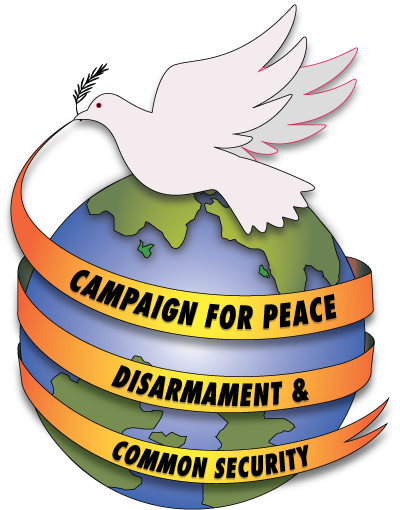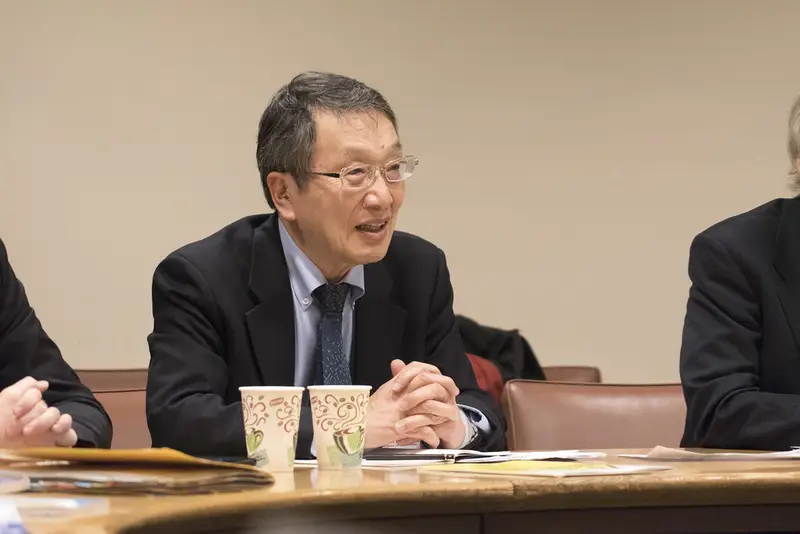by Hiroshi TAKA, Co-chair of the Steering Committee, Organizing Committee of the World Conference against A and H Bombs
First, it was reported that Russian President Vladimir Putin threatened all-out nuclear war in his annual state-of-the-nation address delivered yesterday, saying that Russia’s “strategic nuclear forces are in a state of full readiness for guaranteed use.” The use or threat of use of nuclear weapons is contrary to the UN Charter and is strictly prohibited by the Treaty on the Prohibition of Nuclear Weapons. I strongly protest against President Putin, demanding that he withdraw his statement and immediately stop his illegal war of aggression against Ukraine. I also demand that all nuclear powers, especially the five nuclear weapon states, implement promptly their “undertaking” to “accomplish the total elimination of their nuclear arsenals”.
Bikini Incident — It was an unforgettable tragic case.
The hydrogen bomb test conducted in the small hours on March 1, 1954 by the US forces at the Bikini Atoll in the central Pacific yielded the explosive power of about one thousand times of the Hiroshima atomic bomb. The “deadly ashes” produced by the explosion contaminated the sea, the sky and islands in the Indo-Pacific oceans. Along with residents of the Marshal Islands, many Japanese tuna fishing boats operating in the area suffered from the fallout, and the number of the boats that had to abandon their fish catch totaled some 1,000. Radiation was detected everywhere in Japan wherever it rained those days.
The Japanese Government, pressed by the US, ended the checking of the damage on the tuna boats by the end of that year, and brought the case to a close in exchange for the 2 million dollars of “solatium”. The money was used to cover the medical expenditures and temporary consolation for the crew members of the Daigo Fukuryu Maru (Fifth Lucky Dragon), compensation for the abandoned tuna catch and other losses incurred to the fishing boats and for the compensation for the fall of tuna prices. But neither health survey, words of apology, nor any compensation measures were made to the crew of most other tuna boats up until today.
Taking this opportunity, I call on you all present here to strengthen our solidarity action for the friends from Kochi, the plaintiffs, their families and supporters at the current lawsuits for state compensation and for the reversal of the decision at the court in Tokyo rejecting the allowance of work-related injuries.
The Bikini Incident has another significant meaning.
It is that the Japanese people, under the order of the Supreme Command of the Allied Forces, denied of any information on the damage of Hiroshima and Nagasaki by the first A-bomb attacks in history, stood up at grassroots in nationwide actions against A and H bombs. In August, the National Council of the Signature Campaign against A and H Bombs was formed, and in October, after the news of Aikichi Kuboyama’s death, the number of signatures reached 10 million, and in December, it exceeded 20 million. At the opening of the World Conference against Atomic and Hydrogen Bombs on August 6, 1955, it was announced that the number of signatures had reached 31,583,123. That was more than half of the total number of eligible voters at that time.
This movement had a profound impact on subsequent movements in Japan and around the world.
First, this movement built a huge consensus among the Japanese people against atomic and hydrogen bombs that transcended differences of thought and belief, and gave strength to the development of peace and democracy in Japan. Along with the progress of the signature campaign, assemblies of cities, towns, villages, and prefectures across the country, including Yaizu City, the homeport of the Daigo Fukuryu Maru, passed resolutions one after another calling for a ban on atomic and hydrogen bombs and officially promoted the signature campaign. In April, the House of Representatives and the House of Councillors each passed a resolution to ban atomic and hydrogen bombs. The following year, in 1955, under pressure from the U.S., conservative parties merged to form the Liberal Democratic Party, upholding the banner of “constitutional revision”. But what stood in the way was a massive pile of anti-nuclear signatures signed by the majority of eligible voters.
Further, this movement gave birth to the World Conference against Atomic and Hydrogen Bombs in August 1955, followed by the founding of the Japan Council against A and H Bombs (Gensuikyo) in September, and the Japan Confederation of A-and H-bomb Sufferers Organizations (Nihon Hidankyo) in August 1956. The Atomic Bomb Medical Care Law was enacted in 1957, and the National Peace March against A and H Bombs started in 1958. The birth of these movements and organizations yielded a great influence worldwide in creating a new wave of anti-nuclear peace movement.
On the other hand, the abolition of nuclear weapons and peace are still urgent tasks facing humanity, and the hands of the Doomsday Clock, started by atomic scientists in 1947 to warn of the danger of human extinction, were held at 90 seconds before midnight, indicating the most imminent danger, as announced on January 23 this year.
Nuclear superpower Russia’s lawless invasion of Ukraine is now in its third year and Israel’s indiscriminate attacks and killings of people in Gaza Strip of Palestine continue. The United States has invoked its veto power to prevent a humanitarian ceasefire that would protect innocent lives. Nuclear superpowers continue to trample on the wishes of the peoples of the world for a world without nuclear weapons by trampling on existing nuclear arms control treaties and promoting the buildup and modernization of their nuclear arsenals.
Above all, in Japan, which should be taking the lead in abolishing nuclear weapons, the Kishida government turns its back on the wishes of the people and the Constitution and, in the name of “extended deterrence,” incorporates Japan into the U.S. nuclear strategy and is pushing forward on the path of massive military expansion, tax increases, the explosive purchase and deployment of preemptive strike weapons, and preparations for war.
But the world that many nations and civil society movements have created since Hiroshima, Nagasaki, and Bikini, is no longer a world driven by the arrogant power of the nuclear superpowers.
Whether it is the war in Ukraine or the ceasefire and peace over Palestine/Gaza, even if the Security Council is paralyzed by the arrogance of some nuclear powers, the voices rallying in the UN General Assembly against aggression, for respect of sovereignty and territorial integrity, and resolution of conflicts by peaceful means, are overwhelming.
Among them, the Treaty on the Prohibition of Nuclear Weapons, which was adopted by the United Nations in 2017 and entered into force in 2021, has garnered the support of two-thirds of all member states in the annual UN General Assembly. It has been ratified by 70 countries, and signed by 93 countries, and continues to offer a ray of hope for the future of humanity.
The Treaty itself, as well as the Vienna Declaration adopted in 2022 and the political declaration of the Second Meeting of States Parties last year, condemned the use or threat of use of nuclear weapons as a violation of the UN Charter and called for immediate action by humanity to realize a world without nuclear weapons as the only way to avoid the catastrophic effects of nuclear weapons.
Its power as a norm guides international politics and multilateral meetings, and it binds the hands of the nuclear powers.
Last year, the G7 Summit in Hiroshima, chaired by Prime Minister Kishida, declared in praise of “nuclear deterrence” that nuclear weapons “serve defensive purposes,” “deter aggression,” and “prevent war and coercion.” But just three months later, in the G20 summit in New Delhi, with Russia and the U.S. and Kishida at the table, following the Bali Declaration of the previous year, the leaders rejected the use or threat of force against sovereignty and territorial integrity, and declared that “The use or threat of use of nuclear weapons is inadmissible.”
We must now swiftly and overwhelmingly strengthen this power. It is critically important that we move non-signatories, nuclear weapon states and allies, and especially Japan, the only A-bombed nation, to join the treaty.
To this end, the Japan Gensuikyo proposed at its national board meeting in February a “Nationwide Campaign to Achieve a Nuclear-Free Japan — from 70 Years after the Bikini H-bomb Damage to 80 Years after the A-bombing.”
The Campaign aims for Japan to join the TPNW, to become a country that proudly calls for the abolition of nuclear weapons and peace to all countries in Asia and the world, and to become a country that can conduct diplomacy for peace and security instead of hiding under the “nuclear umbrella”. We also call for similar actions to be taken by peace movements around the world to accelerate the global trend toward a nuclear-weapon-free world. Let us, who gathered on the Bikini Day, join in this action and take an active part in it in our own communities.
The core of the campaign is to convey to people throughout Japan and the world the inhumanity of nuclear weapons, which the Hibakusha have continuously appealed to be incompatible with humanity, and to create a common understanding that what guarantees the security of humanity is not a “nuclear versus nuclear” confrontation but the abolition of nuclear weapons.
To this end, starting today, March 1, the 70th year of the Bikini disaster, and continuing until the end of August 2025, the 80th anniversary of the bombing, the campaign will convey the reality of the A-bombings of Hiroshima and Nagasaki and the damage caused by nuclear tests in Bikini and the Pacific through testimonies and photo panels in every prefecture and region. We will also spread the signature drives to urge Japan to join the TPNW in all regions, schools, and workplaces.
The campaign is open to all organizations, institutions, and individuals who agree with the objectives, either by sponsoring or co-sponsoring the campaign. As we did with the Bikini Signature Campaign, we urge all organizations and individuals within reach to join us, including local governments, school boards, local media, and others.
Today, in the lobby of this hall, we are displaying the actual signatures of the Bikini petitions collected up to 1970. Let us make this action a great success as an action to open the door to a nuclear-weapon-free Japan and a world without nuclear weapons, while recognizing the strong will and energy of the Japanese people that moved history at that time.

